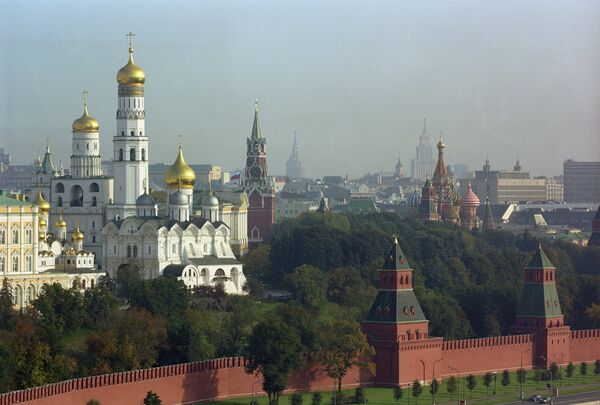MOSCOW, September 2 (RIA Novosti) - Sanctions imposed on Russia by Western countries over the crisis in Ukraine are unlikely to change the mentality of Russia, Tom Switzer, research associate at the United States Studies Centre at the University of Sydney, told Radio VR.
“Ukraine is a vital interest of Russia. The Russians, like most great powers, fight tooth and nail to protect what they see as their vital national interests and will doggedly guide what they perceive as their sphere of influence,” the editor of Spectator Australia and American Review explained.
Moreover, “there is fundamental misreading in Washington and Brussels about Putin’s motivation,” the expert stressed. They blame Russia for the escalating conflict in Ukraine and seem to ignore the fact that Russia’s conduct has largely been defensive. “Given the main narrative in the West, it’s not surprising that countries feel that they can punish and isolate Moscow in order to make Mr. Putin change.”
Switzer recalled Henry Kissinger’s opinion piece in the Washington Post reaffirming that Ukraine should indeed become a buffer state between the East and the West. The expert also said that Ukrainian President Poroshenko has to respect the rights of ethnic minorities that populate eastern regions of the country. Switzer is convinced that will put an end to the crisis. However, “that requires a complete transformation in the thinking in Washington and Brussels.” Regrettably, at this stage that seems unlikely.
Switzer also pointed out that sanctions are counterproductive - the point Moscow has repeatedly made -and primarily affect Western Europe. “The heavy lifting will mainly come from Western Europe if the sanctions are to have any impact.” As a result, some Western European countries “are splintering away from both Washington and Brussels largely because [they] are so dependent on Russia” and likely to pay a higher price than Moscow.
The Eurozone economy has been sluggish since the financial crisis of 2008. Already there is evidence that some countries in the Eurozone are heading back into recession. “Why on Earth would those countries want to punish Russia at a time when they will have to pay a higher price?” the expert asks. That’s why in the coming months some Western European countries may well soften their position” regarding Russia’s role in the Ukrainian crisis.
Commenting on the latest round of sanctions announced by Australia on Monday, Switzer said that “when all things are considered, the renewed round of sanctions will have little consequence because the two-way trade between the countries is only about $200 million.” Indeed, Russia is not a major market for Australia or for that matter for the US.
Switzer is convinced that “tit-for-tat sanctions ultimately don’t satisfy anyone.” However, there have been several calls for the government of Tony Abbott to refuse to invite Russian President Vladimir Putin to the upcoming G20 summit in Brisbane. This is in retaliation not so much for the situation in Ukraine but for the Malaysia Airlines tragedy. Although there is no evidence to support that, some hold Moscow responsible for the MH17 plane crash that left 298 people including 38 Australians killed. “This is an issue that resonates with a lot of Australians.”
Switzer stated that “the point of the institutions like the G20 is not that they are a reward for making other states conform to Western expectations. They provide the means to deal with common challenges.” Therefore, banning Putin from participating in the G20 summit in November will be a mistake, the expert asserted. “There is more to be lost than gained by banning him.”
Breaking off ties with Moscow would be unwise for Australia and the West in general. But isolating Russia is a dead-end strategy, Switzer warned. “Isolating Russia will drive Moscow closer to China and that’s not in the interest of Australia or our great and powerful friend, the United States,” the expert said.



